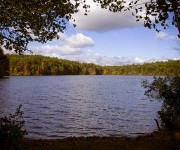Walden Pond.Photo: Troy B. Thompson
I walk toward one of our ponds, but what signifies the beauty of nature when men are base? … Who can be serene in a country where both the rulers and the ruled are without principle? The remembrance of my country spoils my walk.
So spoke Henry David Thoreau, that inveterate nature walker, to an audience in Framingham, Mass., on July 4, 1854, in his great abolitionist address called “Slavery in Massachusetts.” The times and the country have changed, but the words still ring in our ears.
This Saturday, Sept. 24, I’ll be walking with friends and neighbors to Walden Pond, six miles up the road from where I live in Wayland, Mass. We’ll pass a lot of beautiful scenery — historic conservation land, the Great Meadows National Wildlife Refuge along the Sudbury River, organic community-supported farms — but this won’t be any serene nature walk. From Walden, we’ll head to the Concord train station and take the commuter rail (the same Fitchburg line Henry Thoreau knew) into Boston, where we’ll join in the historic worldwide rally for climate action, Moving Planet, and demand that our leaders at all levels get serious about moving beyond fossil fuels.
“Ah, Walden,” you’re thinking. “Of course. Environmentalism. Thoreau. Walden Woods. Don Henley. Right on, man.”
Actually, wrong. Or I should say, only partly right. I’ll be walking to Walden because, like the writings that made it famous, this is about far more than environmentalism. It’s about our humanity.
Henry David Thoreau’s great subject — in Walden and “Civil Disobedience” and just about everything he wrote — wasn’t the environment (a term he wouldn’t recognize) or even nature (though he was a first-rate naturalist). It was “Nature,” as he wrote in his central essay, “Walking,” and “man as an inhabitant, or part and parcel of Nature.” It was our relationship, as human beings — physically, morally, spiritually, politically — to the world in which we live, which is to say, to everything, both human and wild. When he wrote, in that same essay, “in Wildness is the preservation of the world,” he didn’t mean wilderness as we think of it today, but the wildness — life, freedom — within us all. “The most alive,” he wrote, “is the wildest.” And when he wrote, in Walden, that he went to the woods “because I wished to live deliberately, to front only the essential facts of life,” the emphasis was on the words “live” and “life” — as in, how to live authentically as a human being in relation to both nature and other human beings, because the two can’t really be separated.
All of which is to say that Thoreau was not merely an “environmental” writer (though he tops a lot of environmental reading lists). He was a deeply human, moral, and spiritual writer — and a deeply political one. And he knew that on the most pressing moral questions, the spiritual and political can, and often must, go hand in hand — a conviction shared by one of Thoreau’s 20th-century readers, the Rev. Dr. Martin Luther King.
There’s also a popular misconception that Thoreau was a hermit or recluse, indulging a utopian fantasy in his refuge in the woods. Recently, Harvard economist Edward Glaeser, in his book Triumph of the City, even went out of his way to paint Thoreau as a kind of clueless, dreamy nature boy, out of touch with the real world, a stand-in (or straw man) for a certain kind of modern-day environmentalist. (Glaeser means well, but never let an urban economist lecture you on Thoreau.) And yet Walden isn’t about some solitary back-to-nature trip, it’s about waking up to one’s immediate reality, in the present moment, right where you live, and engaging the world. And not doing it quietly, or in isolation, but as Thoreau writes in Walden, to shout “as lustily as chanticleer in the morning, standing on his roost, if only to wake my neighbors up.”
Thoreau’s cabin at Walden was no retreat from the world, and his project was not, primarily, about the virtues of solitude. He not only kept up a social life at the pond, more to the point, he remained socially and politically engaged.
In fact if anyone took refuge in that cabin, it was the runaway slave Thoreau sheltered along the Underground Railroad. Thoreau’s antislavery activism, in words and actions, needs to be remembered as central to his legacy. For Thoreau, to be morally awake and in harmony with nature meant to act on behalf of human freedom.
In May 1854, as Thoreau was putting his final touches on Walden, another runaway slave named Anthony Burns was arrested in Boston. A riotous crowd, led by abolitionist friends of Thoreau’s, tried to free Burns from the city’s courthouse, but Burns was sent back to the South after federal troops intervened. On July 4, at the rally in Framingham, Thoreau delivered his fiery abolitionist speech “Slavery in Massachusetts” and indicted the commonwealth for its complicity in human bondage. His sense of serenity in nature was shaken. “The remembrance of my country spoils my walk.”
But did remembrance of his country really spoil the walk, or remind him of the walk’s purpose? Thoreau’s immersion in nature, and his spiritual awakening there, led him back to society and its reform.
There is no greater threat to human freedom today than climate change. If slavery was the human, moral crisis of Thoreau’s time, then global warming — and its impact on countless innocent lives, starting with the poorest and most vulnerable, far and near — is the human, moral crisis of our own. We know that our burning of fossil fuels is global warming’s major cause, with vast and potentially catastrophic consequences for future generations, including our own children.
And as Thoreau knew, in the face of such facts the thing to do is not retreat, but engage.
There’s still time — if we act — to preserve a livable planet for our children. But it’s going to take more than small gestures of personal green virtue. It’s going to take decisive government action — a stiff price on carbon, major investments in clean energy, real global commitments — which means it’s going to take a political movement that transcends environmentalism. It means changing the political equation in this country, on the ground, at the grassroots. That’s what Moving Planet, this Saturday, is all about: Building a new movement. Because the climate crisis is more than an environmental crisis, it’s a human crisis, and we need a new politics to address it on those terms.
That may sound hopeless, especially now. But then, abolishing slavery sounded hopeless in 1854 — as the author of Walden, and “Slavery in Massachusetts,” no doubt knew.
A shorter version of this piece appeared on the op-ed page of The Boston Globe on Sept. 22. Portions of it are adapted from the 5-part Slate series “Walking Home From Walden.”)



